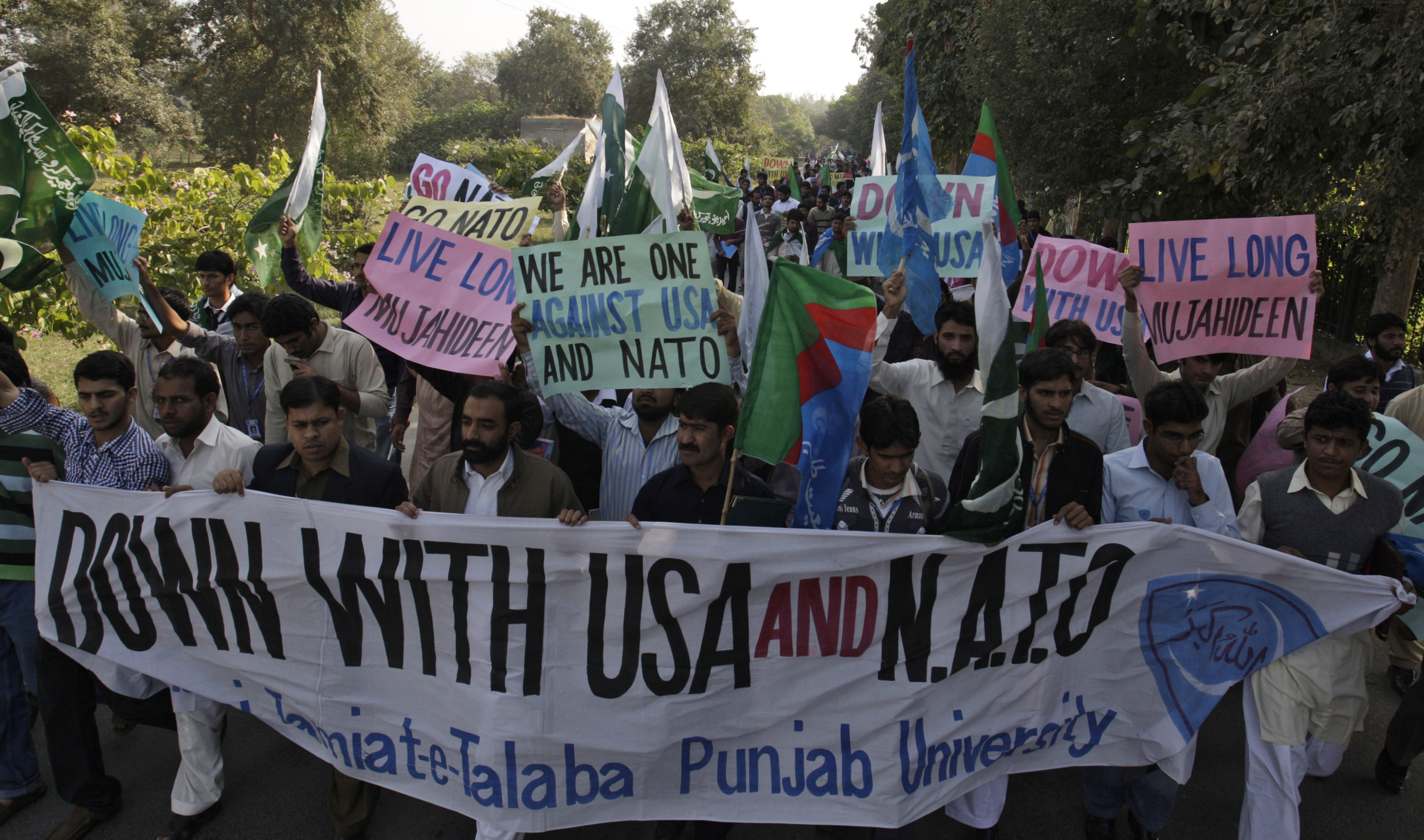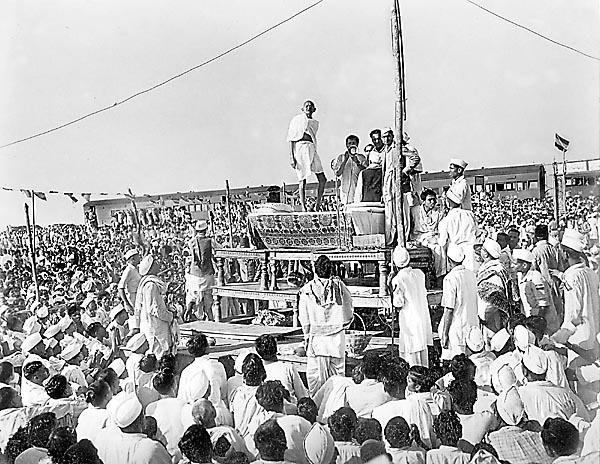US friendly fire knows no bounds. The deaths of Pakistan soldiers and civilians is just the tip of the iceberg, which will only disappear in the heat of a national uprising, putting an end to Pakistan's neocolonial dependency, says Eric Walberg
It's
hard to imagine a greater provocation than your bosom buddy killing 28
of your own soldiers. NATO helicopters violated the airspace of Pakistan
from Afghanistan on Friday and opened unprovoked fire on a check post
in Mohmand, northwest Pakistan at midnight. Presumably the pilots got
the wrong coordinates from MacDill Air Force Central Command in Florida
or took too many army-prescribed uppers. The attack continued even after
Pakistani commanders pleaded with coalition forces to stop.
As a
show of anger, Pakistan ordered the CIA to vacate drone operations at
Shamsi Air Base in southwestern Baluchistan and closed both the Khyber
and Baluchistan supply routes into Afghanistan, cutting off 70 per cent
of NATO's supplies. It was the worst such incident since 9/11.
This
is not the first time NATO helicopters attack Pakistani soldiers or
that Pakistan closed the Khyber Pass. A US airstrike in 2008 killed 11
soldiers and last year two, prompting Pakistan to shut the Khyber Pass
for 10 days in protest against the almost daily, illegal and
unsanctioned US air strikes that since 2004 have killed 2,780 people, 83
per cent civilians, among them 72 soldiers.
However, this time
the rhetoric is full blast. Prime Minister Yousuf Gilani announced
Pakistan would boycott the crucial Bonn II conference on Afghanistan
this week, fatally undermining it. Army Chief General Ashfaq Kayani call
the attack a "blatant and unacceptable act", and Interior Minister
Rehman  Malik insisted on Sunday that the "NATO supply line had not been
suspended but permanently stopped."
Malik insisted on Sunday that the "NATO supply line had not been
suspended but permanently stopped."
That is highly unlikely, but
this could be the trigger for a political earthquake against a despised
national government. MP Ahmed Khan Bahadur from the Khyber Pakhtunkhwa
provincial Awami National Party told CNN, "This is the time to be united
as a nation and to punch NATO with a fist. NATO could never dare if we
were united." Politically ambitious media star Imran Khan, who heads the
Pakistan Tehreek-e-Insaf Party, said it was time for Pakistan to pull
out of the US-led "war on terror". Hundreds of thousands have rallied in
Peshawar, Islamabad, Lahore and Karachi to protest government
corruption and the alliance with the US.
To even begin to
explain the mad "logic" of US world military strategy which resulted in
this "blatant and unacceptable act", we must look at the other recent
NATO undertakings in the Middle East; namely, the invasion of Libya, the
approaching invasion of Syria and the ongoing attempts to subvert Iran.
The US-Israeli strategy of carving up the current regimes in order to
leave Israel as the undisputed regional hegemon is well known. The plan
is for the latest version of the Middle East to be unapologetically
sectarian, based on conservative Islam and Judaism. No room for any real
democracy, which could lead to socialism, or worse, nationalism, and
the inevitable jihad against Israel.
The Muslim world could
easily bury the Zionist state if the spark to light it were to
spontaneously appear. So, just as forest rangers light strategic fires
to clear brush and prevent uncontrolled fires from erupting, the US must
light fires around Israel which burn themselves out. The tribes and
conservative Islamists in Libya, and the Christians, Alawis and Sunnis
in Syria will soon be tearing each other up, "part of the Turkish sphere
of influence, aligned with NATO and non-hostile to Israel. In other
words, another Pakistan," quips analyst Come Carpentier.
The Arab
Spring is the logical conclusion of the carving up of the Middle East
following WWI&II, creating regimes which from the start were
subservient, or, in the case of say Egypt under Nasser, brought into
line after a brief rebellion. As for Pakistan, from the start, it too
was very much an imperial-controlled forest fire. Britain's most
pressing problem following WWII was trying to control the  march to
independence in India, to prevent it from aligning with the Soviet
Union. Sectarian India and Pakistan were created thanks to British
intrigue, and the latter has been a faithful ally of empire ever since.
march to
independence in India, to prevent it from aligning with the Soviet
Union. Sectarian India and Pakistan were created thanks to British
intrigue, and the latter has been a faithful ally of empire ever since.
The
1947 founding of this unapologetically sectarian Muslim nation (just
months before the founding of the sectarian Jewish nation of Israel) set
the pattern that has unfolded in the region ever since: divide and
rule, igniting civil wars where necessary to prevent any of these
geopolitically vital nations exiting the US orbit or from threatening
Israel. That millions died in the creation of these states, and in the
neocon jihad against Communism from 1979 on, is not of the least
importance. After all, few casualties are white Americans, and they are
useful Heroes who protected Americans from Reds and Towelheads.
Thus,
the cool reaction by the US to the Pakistani fury, which just barely
hides the implicit racism of imperial fiat. That Pakistan is a failed
state, its elite totally dependent on US handouts, means that the
occasional closing of the Khyber Pass or even the attack on the US
embassy in Kabul by a certain Pakistan-based (Haqqani) resistance group
can be tolerated. US officials sometimes chide their Pakistani
colleagues with "playing a double game", a warning not to push the
boundaries too far, but the planners on all sides know that all the
players are playing at least several roles in the geopolitical play-off
now underway, the winner being the one who sees that extra move ahead
and is able to plan for it.
In a sense, the game has become
incredibly complex, with supposed allies of empire -- from Mubarak and
Gaddafi to mujahideen and, increasingly, Pakistan soldiers -- moving
from ally to enemy in the twinkling of an eye. The Arab Spring is even
now being subtlely and not-so-subtlely manipulated from Washington, with
daily briefings and financial aid to Egypt's ruling generals ("more
democracy but not if it harms Israel"), daily bombings for others
(Libya, Syria, Iran, Pakistan), or a blind eye to cruel autocracies
which are able to crush their opposition and continue to faithfully
serve the cause (Saudi Arabia, Bahrain). This apparent complexity and
chaos is not complex or chaotic at all, but the realisation of
contingent strategies in pursuit of clear goals. Egyptian analyst
Mohamed Heikal calls it the new "Sykes-Picot agreement".
The
goals and rules of the game are in fact age-old. In the first place, the
US dollar and profit, followed by military might and its transformation
into political soft power, used to buttress the dollar and ensure the
flow of profit from the colonial (now neocolonial) periphery to the
imperial centre.
So the huffing and puffing of even generals in
the periphery can be tolerated, since they must inevitably bite the
imperial bullet so it doesn't explode in their faces. Similarly, the
tens of thousands of deaths resulting from "collateral damage" or the
inevitable uprisings against the vicious reality of neocolonialism, now
dubbed the Arab Spring.
Also very simple for the sports fan to
understand is how the game will end. History shows conclusively that
empires inevitably fall, the victims of overreach. Just as the US lost
in Vietnam, leaving it bloodied and destroyed, so it will lose in
Afghanistan and will eventually leave Pakistan, both devastated, but in
the long run, beholden to empire. The Vietnamese communists supposedly
triumphed -- a rare win against empire -- but three short decades later
are now allying unashamedly with the empire against holdout China. The
logic in AfPak is presumably to pack up and leave AfPak a series of
sectarian, feuding entities (states?), whose new elites similarly will
be reaching out to the empire in the face of holdout Iran.
But
these holdouts -- China the heir to the communist foe of yesteryear,
Iran the Muslim heir to the anti-communists of yesteryear -- are now key
players in the game, the only ones who play to beat the imperialists,
not just to a draw or stalemate. As the prospect of losing the game in
Iraq and Afghanistan looms, Iran gains greater regional importance,
without having to do much except survive the intense efforts by the
empire to subvert it. From a distance, China similarly must only be
patient, continuing to expand its economic might. Both these countries,
unlike AfPak, Libya, Iraq and Syria, are much more united around a
strong sense of historic destiny and national self-awareness -- in the
end, impossible for the empire to successfully subvert.
America's
increasingly unwilling Pakistan ally is increasingly turning to both.
In the wake of the collapse of US-Pakistani relations, Pakistan
confirmed its gas pipeline project with Iran would be online by 2013,
flouting US pressures to nix the deal and instead wait for the
trans-Afghanistan pipe dream (excuse me, pipeline). Iran need not drop
bombs or invade its neighbours (it ended any imperial pretensions in the
17th century), but like China, seduce them economically. The pipeline
will also export gas to Turkey, Armenia and even Iraq. Iran has
excellent relations with nearby India, Russia and, of course, China. But
of course, Pakistan's main lifeline is still the US.
Whether
the Western intervention in Libya and Syria will turn them into willing
(if conservative Islamic) allies of imperialism a la Saudi Arabia,
Morocco or, yes, Pakistan, is yet to be seen. But this is the game plan,
and the seemingly bizarre friendly fire on its lapdog ally, as happened
last week, is from Washington's point of view merely a blip in the
old-fashion regional radar it inherited from Britain. Unless of course
Pakistan has its 25 January moment.





